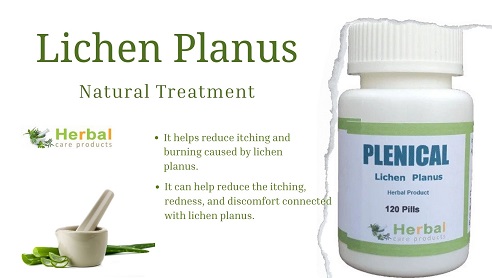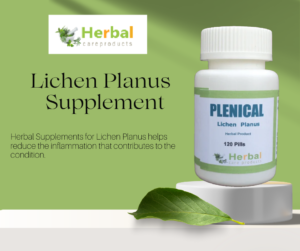
Lichen planus is a chronic inflammatory condition that can affect the skin, mucous membranes, nails, and scalp. This autoimmune-related disease is characterized by itchy, purple lesions on the skin, painful sores in the mouth, and other discomforts. Though the exact cause of lichen planus remains unclear, research suggests a combination of genetic and immune system factors, which may lead the body to mistakenly attack its own tissues. While conventional treatments like corticosteroids and immune suppressants are commonly prescribed, some people are exploring dietary and supplemental strategies to alleviate symptoms naturally. The best supplements for lichen planus, analyzing their benefits, risks, and scientific backing.
What is Lichen Planus?
Lichen planus is a chronic, inflammatory autoimmune condition that affects the skin, mucous membranes, nails, and, in some cases, the scalp. Characterized by itchy, purple, flat-topped bumps on the skin, lichen planus can also cause white, lacy patches or painful sores in the mouth, as well as discomfort in other areas. The condition is relatively rare, and while it can appear at any age, it’s more common in adults, particularly those aged 30-60.
Top Supplements for Lichen Planus
Lichen planus is an autoimmune, inflammatory condition that can cause itchy, purple skin rashes, oral sores, and discomfort on other mucous membranes. While there’s no cure for lichen planus, some people find relief by using supplements to help manage inflammation, boost immune function, and support healing. Here are some of the best Supplements for Lichen Planus and how they may help.
1. Omega-3 Fatty Acids
Omega-3s, commonly found in fish oil, flaxseed oil, and chia seeds, are well-known for their anti-inflammatory properties. For people with lichen planus, omega-3s can help reduce the inflammatory response and may lessen symptoms like redness, itching, and irritation.
How it Works: Omega-3 fatty acids inhibit inflammatory pathways, helping reduce immune responses that contribute to lichen planus flare-ups.
Recommended Dosage: 1,000-3,000 mg per day, but it’s a good idea to consult with a healthcare provider, especially if you are on blood-thinning medications.
2. Vitamin D
Vitamin D plays a significant role in immune system regulation, which is essential for managing autoimmune conditions like lichen planus. Many people with autoimmune issues have low vitamin D levels, so maintaining an optimal level may help alleviate symptoms.
How it Works: Vitamin D modulates immune cells and may reduce overactivity in the immune system, potentially leading to fewer flare-ups and a decrease in symptom severity.
Recommended Dosage: 1,000-2,000 IU daily, or as recommended by a healthcare provider based on blood tests.
3. Curcumin
Curcumin, the main active ingredient in turmeric, has potent anti-inflammatory and antioxidant properties. It can be an excellent addition to the supplement regimen for those with lichen planus, as it helps combat inflammation and protect cells from oxidative stress.
How it Works: Curcumin inhibits inflammatory pathways and helps prevent damage to cells, potentially reducing the severity of skin and mucous membrane symptoms.
Recommended Dosage: 500-1,000 mg daily, ideally combined with black pepper extract (piperine) to enhance absorption.
4. Probiotics
Since gut health is closely linked to immune function, probiotics can play a helpful role in managing Lichen Planus Treatment Natural symptoms. A healthy gut microbiome supports immune balance, which may lessen autoimmune flare-ups and improve overall wellness.
How it Works: Probiotics help promote a healthy balance of gut bacteria, which can positively influence immune responses and reduce inflammation.
Recommended Dosage: 10-20 billion CFUs daily; starting with a lower dose is recommended to see how the body responds.

5. Zinc
Zinc is essential for immune health and skin repair, which makes it potentially beneficial for people with lichen planus. Since zinc deficiencies are associated with immune dysfunction, supplementing may help support proper immune responses and reduce inflammation.
How it Works: Zinc helps support immune function and cellular repair, reducing inflammatory responses and promoting healing of damaged skin and mucous membranes.
Recommended Dosage: 15-30 mg per day, but cycling on and off is advisable to prevent long-term accumulation.
6. Aloe Vera
Aloe vera can help relieve symptoms, especially in cases of oral lichen planus. It has anti-inflammatory and soothing properties that can reduce pain and help heal sores in the mouth and other mucous membranes.
How it Works: Aloe vera contains compounds that promote healing and reduce inflammation, making it helpful for painful lesions.
Recommended Dosage: Topical aloe vera gel or mouth rinse for oral lesions; use aloe products that contain at least 10-20% polysaccharides for effectiveness.
7. Vitamin C
Vitamin C is a powerful antioxidant that supports immune function and helps the skin and mucous membranes heal. It can help reduce oxidative stress that can worsen inflammation and damage skin and oral tissues.
How it Works: By combating free radicals and supporting immune balance, vitamin C can help reduce inflammation and promote healing.
Recommended Dosage: 500-1,000 mg per day, preferably with meals.
Precautions and Considerations
When using supplements for lichen planus, it’s essential to remember the following:
- Consult with a healthcare provider before starting any new supplement, especially if you are on medications or have existing health conditions.
- Quality matters: Choose high-quality supplements from reputable brands, as impurities in supplements can sometimes worsen autoimmune symptoms.
- Lifestyle factors: Supplements are only part of the picture; a balanced diet, stress management, and adequate sleep are crucial for managing lichen planus effectively.
Final Thoughts on Supplements for Lichen Planus
Lichen Planus is a complex and often stubborn autoimmune condition, but supplements targeting inflammation, immune modulation, and antioxidant support may offer relief for some people. Omega-3s, vitamin D, curcumin, and probiotics are among the most promising options, and each of these supplements offers unique benefits that address the multifaceted nature of lichen planus. Always consider professional guidance, as individual needs vary, but with the right approach, supplements for lichen planus can play an integral role in improving symptoms and enhancing overall quality of life.





